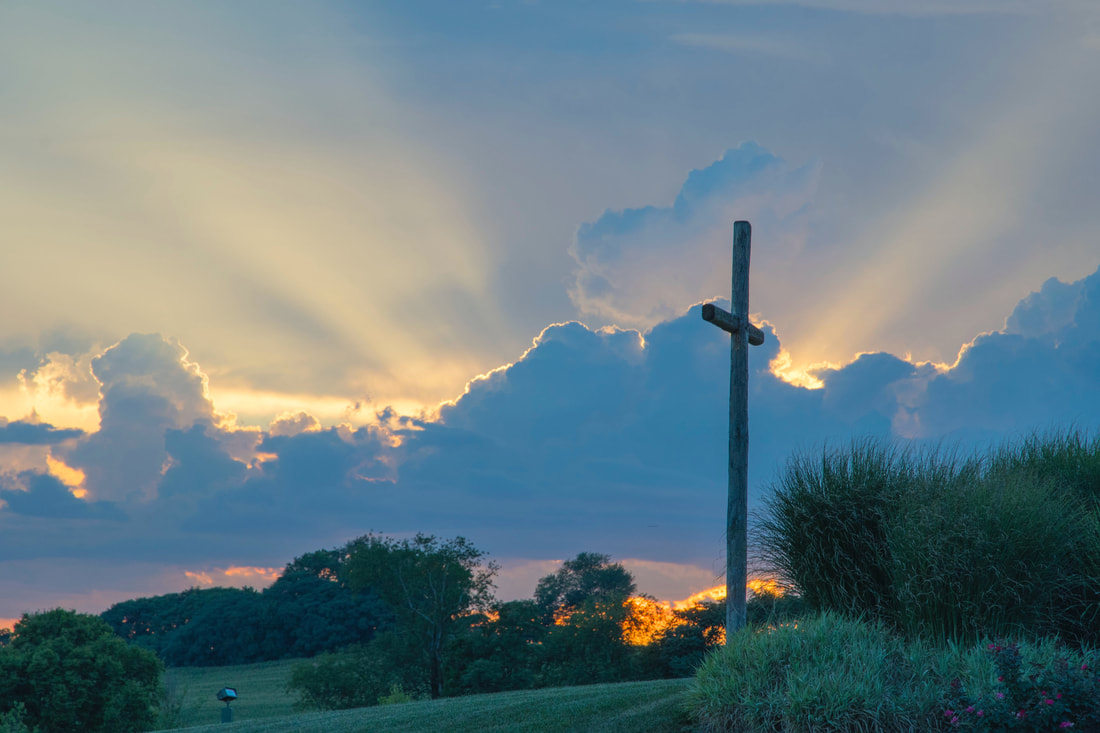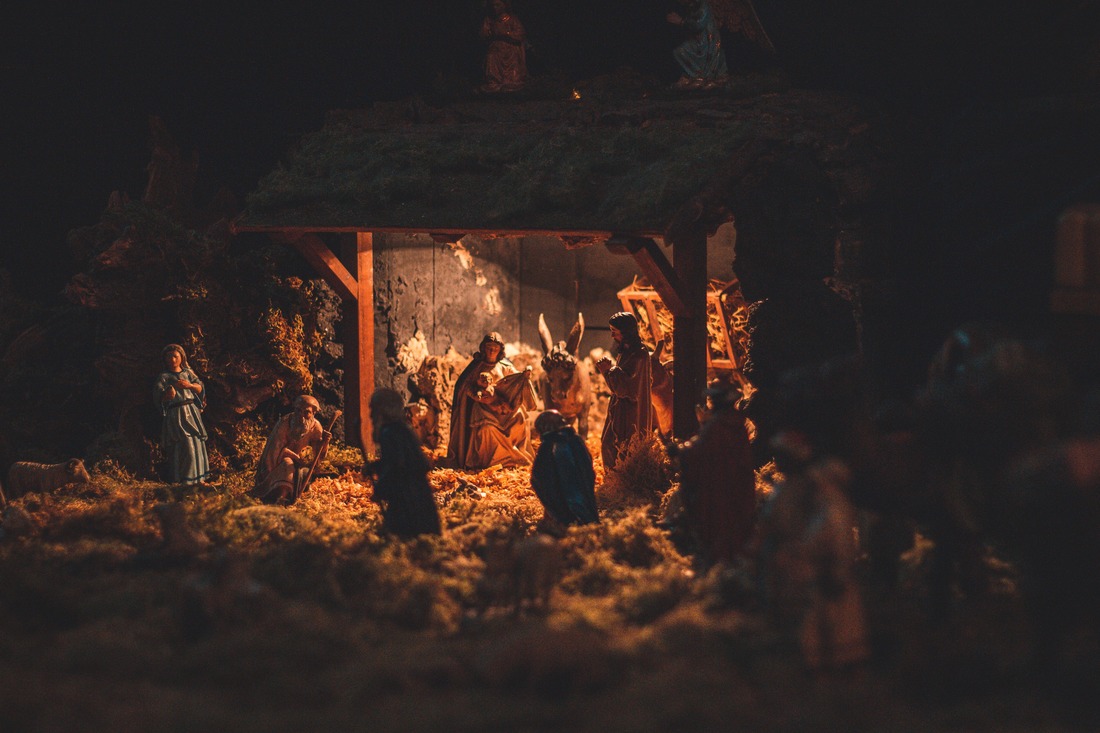|
Psalm 33 comes to mind as I contemplate the events of last weekend. "Let all the earth fear the Lord; let all the people of the world revere Him. For He spoke, and it came to be; He commanded, and it stood firm. The Lord foils the plans of the nations; He thwarts the purposes of the people. But the plans of the Lord stand firm forever, the purposes of His heart through all generations. Blessed is the nation whose God is the Lord, the people He chose for His inheritance. From heaven the Lord looks down and sees all mankind; from His dwelling place He watches all who live on earth--He who forms the hearts of all, who considers everything they do. No king is saved by the size of his army, no warrior escapes by his great strength. A horse is a vain hope for deliverance; despite all its great strength it cannot save. But the eyes of the Lord are on those who fear Him, on those whose hope is in HIs unfailing love, to deliver them from death and keep them alive in famine." (Psalm 33:8-19)
Prime Minister Netanyahu said it well..."The shooting of Trump is an attack on America and an attack on democracy." Our country got a wakeup call on Saturday, July 13, when a 20-year old man climbed up on a roof and shot Donald Trump as he was making a speech in Butler, PA. Details as to who he is and why he would do this are slim, but his actions have awakened the people of America. My hope is that everyone will contemplate their frailty and open their hearts to the Eternal God who holds our lives in HIs hands. Job said, "He thwarts the plans of the crafty, so that their hands achieve no success." (Job 5:12) After spending time in considerable suffering and complaining to his friends, Job acknowledged that he had been talking over his understanding. Also, after meeting the Sovereign God and realizing that God was with him through it all, his testimony was, "I know that you can do all things; no plan of yours can be thwarted." (Job 42:2) Several verses in Proverbs agree with Job's testimony. "In his heart a man plans his course, but the Lord determines his steps." (Proverbs 16:9) "There is no wisdom, no insight, no plan that can succeed against the Lord." (Proverbs 21:30) None of us can presume on tomorrow or even the next minute as the attempt on Donald Trump's life so visibly shows us. James 4:14 warns, "But you don't have a clue what tomorrow may bring, for fleeting life is but a warm breath of air that is visible in the cold only for a moment and then vanishes!" (TPT) The writer of Ecclesiastes tells us that God makes everything fit together in its timing. He says, "There is a time for everything, and a season for every activity under heaven." (Ecclesiastes 3:1) Chapter 8, Verse 6 says, "For there is a proper time and procedure for every matter." The life of Donald Trump has been spared by our Sovereign God. Dutch Sheets articulates the perspective of many: "If Trump ever questioned God's hand and destiny on him, he should now be fully assured of it." President Trump himself recognizes the protection of God and the mandate that he must move forward. He wrote a social media post that says, "Thank you to everyone for your thoughts and prayers yesterday, as it was God alone who prevented the unthinkable from happening. We will Fear Not, but instead remain resilient in our Faith and Defiant in the face of Wickedness...In this moment, it is more important than ever that we stand United, and show our True Character as Americans, remaining Strong and Determined, and not allowing Evil to Win. I truly love our country, and love you all, and look forward to speaking to our Great Nation this week from Wisconsin." What should our response be in light of the events of July 13? May I suggest that we live every day as if it were our last. The Psalmist reminds us that our days are numbered. (Psalm 90:12) We must use every opportunity to love and encourage those around us and to nurture our relationship with the Lord. Let us also pray for protection over, wisdom to infuse, and fear of the Lord to overtake those who are running for office and who have a call on their lives to lead America into the future. Another quote from Donald Trump should be kept in mind. "None of us knows God's plan, or where life's adventure will take us. But if the events of last Saturday make anything clear, it is that every single moment we have on Earth is a gift from God.” Friends of ours who are missionaries in Kenya had to be particular about the way they built the foundation of their home. It sits on the Rift Valley on land where the earth's tectonic plates move apart or rift. The rift is approximately 5,950 km long and runs through eastern Africa up to the Red Sea and into Western Asia. The tectonic plates are constantly in motion, shifting against each other in the fault zones. Since the foundation is the lowest part of a building, it interacts with the soil and transmits the load of the structure to the soil below. Homes built in the Rift Valley need a deep foundation that is reinforced with extra rebar. Some have expansion joints (springs that function as shock absorbers).
The Bible records the words of Jesus about wise and foolish builders in Luke 6. He was talking to the crowds of people, sharing with them about how to live godly lives. He told them, "Whoever comes to Me, and hears My sayings and does them, I will show you whom he is like: He is like a man building a house who dug deep and laid the foundation on the rock. And when the flood arose, the stream beat vehemently against the house, and could not shake it, for it was founded on the rock. (Jesus) But he who heard and did nothing is like a man who built a house on the earth without a foundation, against which the stream beat vehemently, and immediately it fell. And the ruin of that house was great." (Verses 47-49- NKJV) As Christians we must also establish a sturdy foundation to endure the shakings of our age, the attacks from the demonic realm, and the trials that come our way. We started building our foundations when we professed faith in the Lord Jesus. We must be continually adding to our faith through standing firm in our belief that God who "calls us is faithful, and He will to it." (1 Thessalonians 5:24) Isaiah 28:16 and 17 have words of encouragement for us. If we embrace these verses they will help to build our faith foundations. "See, I lay a stone in Zion, a tested stone, a precious cornerstone for a sure foundation; the one who trusts will never be dismayed. I will make justice the measuring line and righteousness the plumb line. This verse introduces the word “trust." It is our faith in the Lord that helps us to trust in Him. Isaiah 33:6 ushers in another aspect of foundation building. "He will be the sure foundation for your times, a rich store of salvation and wisdom and knowledge; the fear of the Lord is the key to this treasure." The fear of the Lord means we are in awe of Him and that we have a deep reverence and respect for Him. There are many benefits to having the fear of the Lord. Here are a few: "But the eyes of the Lord are on those who fear Him, on those whose hope is in His unfailing love." (Psalm 33:18) "The angel of the Lord encamps around those who fear Him, and He delivers them." (Psalm 34:7) "The fear of the Lord is the beginning of wisdom..." (Psalm 111:10) "Blessed are all who fear the Lord, who walk in obedience to Him." (Psalm 128:1) "The fear of the Lord is the beginning of knowledge..." (Proverbs 1:7) "The fear of the Lord is a fountain of life, turning a person from the snares of death." (Proverbs 14:27) "The fear of the Lord leads to life; then one rests content, untouched by trouble." (Proverbs 19:23) To add strength to our foundations we must be in The Word daily, infusing ourselves with His truth. I believe that as we walk out His Word, the quakes and shakings will not make an impact on our foundations, and we will be able to stand through trials and temptations. It would be faith-building for us to meditate on 1 Peter 1:3-7 this week. "Praise be to the God and Father of our Lord Jesus Christ! In His great mercy He has given us a new birth into a living hope through the resurrection of Jesus Christ from the dead, and into an inheritance that can never perish, spoil, or fade—kept in heaven for you, who through faith are shielded by God's power until the coming of the salvation that is ready to be revealed in the last time. In this you greatly rejoice, though now for a little while you may have had to suffer grief in all kinds of trials. These have come so that your faith—of greater worth than gold, which perishes even though refined by fire—may be proved genuine and may result in praise, glory, and honor when Jesus Christ is revealed." Let this truth be a shield and fortification for our faith foundations. Memorial Day, held the last Monday in May, is meant to be a time to honor the deceased who served our country. It was originally known as Decoration Day and was put in place in the years following the Civil War. In 1971 it became an official federal holiday. Parades, including marching bands and veterans’ organizations, take place in towns throughout the United States. The tradition of honoring those who have fallen in battle dates to the ancient Greeks and Romans when they decorated the graves of the soldiers with flowers—hence Decoration Day. One tradition is that the American flag be hung at half-staff until noon on Memorial Day, then raised to the top of the staff.
Looking back to the Civil war era, the outlook for the Union soldiers was dark. President Abraham Lincoln issued a proclamation calling for the citizens of our nation to humble themselves before God and repent. In part, the proclamation said this: "...It is the duty of nations, as well as of men, to own their dependence upon the overruling power of God; to confess their sins and transgressions in humble sorrow, yet with assured hope that genuine repentance will lead to mercy and pardon; and to recognize sublime truth announced in the Holy Scriptures and proven by all history that those nations only are blessed when God is the Lord...It behooves us, then, to humble ourselves before the offended Power, to confess our national sins, and to pray for clemency and forgiveness." Oh, that we would have a president who would lead us in this kind of prayer of humility and repentance today! Our country is in shambles, and the only light in the darkness comes from Bible-believing, compassionate, and God-fearing individuals. To save our country, we must be on our knees before our Holy God. Sadly, I think that Lincoln would have been run out of town today had he made the proclamation he did during the Civil War. He and the citizens of our country knew that America was formed as a land without religious persecution. The Preamble to our Constitution lays out other goals: "To form a more perfect union, to establish justice, to ensure domestic tranquility, to provide for common defense, to promote the general welfare, and to secure the blessings of liberty." While God is not mentioned in the Constitution, He is included in the Declaration of Independence, the Pledge of Alliance, and in U.S. currency. Eddie Hyatt's book, America's Revival Heritage, explains the Puritan's vision for a Christian Commonwealth. He writes, "They believed that God had created society as a unified whole to reflect His glory. Church and state, the individual and the public—These were all related spheres and all were to function under the Lordship of Christ..." Eddie explains that the statements the Puritans wrote "always gave recognition to God and prioritized the Gospel of Jesus Christ as the reason for their existence...Their vision was to become that 'shining light' and 'city on a hill' of which Jesus had spoken in Matthew 5:14. (Pages 13-15) We have come a far way from the day of Abraham Lincoln when people honored their covenant with God and were not fearful of praying publicly. As Memorial Day is upon us, let us remember not only our fallen soldiers, but the reasons they gave their lives for our country. We have a covenant with God, and He gives us the solution to our dilemma of ungodly belief and behavior. "If my people, who are called by my name, will humble themselves and pray and seek my face and turn from their wicked ways, then I will hear from heaven and will forgive their sins, and heal their land." (2 Chronicles 7:14) In a spiritual warfare battle, the tongue is the most critical weapon. Scripture tells us, "Death and life are in the power of the tongue." (Proverbs 18:21 - NKJV) When we face situations that defy the will of God, we must speak God's truth to overcome the forces of the enemy. I can think of no better example than when Jesus identified Himself to the Roman soldiers who came to arrest Him. Rich Renner writes about this in his book titled, Paid in Full.
The first time God identified Himself He was speaking to Moses on Mount Horeb or Sinai. "God replied to Moses, 'I Am Who I Am.'" (Exodus 3:14 - NLT) By using the name "I Am," God was describing His eternal power and unchanging character. He identified Himself as the ever-existing God. Jesus was to use these words several times, and they are record in the book of John. In John 8 we read of an encounter that Jesus had with the religious leaders. They ask Him a pointed question in verse 53. "'Who do you think you are?' Jesus replies, 'Your Father Abraham rejoiced at the thought of seeing my day; He saw it and was glad.'" (Verse 56) They responded, "You are not yet 50 years old, and you have seen Abraham!" (Verse 57) Jesus blows them away with His response: "Very truly I tell you, before Abraham was born, I am!" (Verse 58) The leaders picked up stones to stone Jesus, but He slipped away because His time to die had not yet come. "I Am" is the Greek words "Ego Eimi." John recorded several statements of who God made Him to be: "I am the bread of life." (6:35) "I am the light of the world." (8:12) "I am the gate for the sheep." (10:7) "I am the good Shepherd." (10:11) "I am the resurrection and the life." (11:25) "I am the way, the truth, and the life." (14:6) "I am the vine and my Father is the gardener." (15:1) Each of these images gives us a partial picture of who Jesus is. At The Last Supper, Jesus was speaking to His disciples and said, "I am telling you now before it happens, so that when it does happen you will believe that I am who I am." (John 13:19) After this statement, He tells the disciples that one of them will betray Him. Jesus was to identify Himself this way again when Judas came to betray Him with a band of Roman soldiers. The disciples were with Jesus in the olive grove called Gethsemane when He was confronted by the armed soldiers. Judas greeted Him with a kiss, which was to be the sign that He was the one to be taken away. The story continued: "Jesus, knowing all that was going to happen to Him, went out and asked them, 'Who is it you want?' 'Jesus of Nazareth,' they replied. 'I Am,' Jesus said...When Jesus said, 'I Am,' they drew back and fell to the ground." (John 18:4-5) The words Jesus spoke were "Ego Eimi," "I Am," the very words that God spoke to Moses on Mount Sinai. The soldiers were to learn that by a mere word, Jesus could overpower them. Jesus made it clear to them that He could not be taken by force. After this, He willingly surrendered to the troops as they were picking themselves up from the ground. Jesus is for us The Great "I Am." His promises come with power. The problems we face can be knocked to the ground, like the soldiers, through the mighty promises of God. We must boldly affirm who we are in Christ. Speaking the truth of God's Word brings the Lord's power and authority into every situation. The third chapter of James in the New Testament gives us pictures of the power of our tongues. The Passion Translation is very descriptive. "Horses have bits and bridles in their mouths so that we can control and guide their large body. And the same with mighty ships, though they are massive and driven by fierce winds, yet they are steered by a tiny rudder at the direction of the person at the helm. And so, the tongue is a small part of the body, yet it carries great power! (The Aramaic can be translated, "The tongue has dominion.") Just think of how a small flame can set a huge forest ablaze. And the tongue is a fire! It can be compared to the sum total of wickedness, and is the most dangerous part of our human body. It corrupts the entire body and is a hellish flame! It releases a fire that can burn throughout the course of human existence." (James 3:3-6)
Proverbs 18:21 summarizes the verses of James in one sentence: "Death and life are in the power of the tongue, and those who love it will eat its fruit." (NAS) Let's say this another way. There are only two kingdoms: The Kingdom of Heaven or Light and the Kingdom of Darkness. When we use our tongues to speak, our words always agree with one kingdom or the other. And our words will determine whether we are blessed or cursed. It is wise for us to remember the truth that we have been made in the image of God, so we have power as He does to bless or curse ourselves or others with our tongues. When God decided to bring judgment on a rebellious nation, He frequently pronounced a curse over them. Yet the foundation of God's throne is righteousness and justice. (Psalm 89:14) He gives us opportunities to come out from under a curse and into blessings. We must also be aware that family members or associates may have pronounced curses over us. Again, God gives us a way to be free of all of them. Derek Prince's book Blessing or Curse - You Can Choose, gives us a seven-step way to move into God's blessings: 1. "Confess faith in Christ and His sacrifice on your behalf. 2. Repent of all your rebellion and your sins. 3. Claim forgiveness of all sin. (This is the greatest barrier that keeps God's blessings from us.) 'If we confess our sins, He is faithful and just to forgive us our sins and to cleanse us from all unrighteousness.' (1 John 1:9) 4. Forgive all other people who have ever harmed or wronged you. 5. Renounce all contact with anything occult or satanic. 6. You are now ready to pray the prayer of release from any curse. Here it is: 'Lord Jesus, I believe that on the cross you took on Yourself every curse that could ever come upon me. So, I ask you now to release me from every curse over my life, in the name of the Lord Jesus Christ! By faith I now receive my release, and I thank you for it.' 7. Now believe that you have received, and go on in God's blessing!” (Taken from pages 210-217 of Derek's book) God has creative ways to release blessings into our lives. We must accept that He will do so in His way and in His timing. The Lord has a storehouse of blessings for us that will help us to reach our destinies. Derek Prince says, "We must depend upon the Holy Spirit to guide us into our full inheritance and to show us how to appropriate what God has provided for us." (Page 224) In the meantime, we have the responsibility to make positive confessions that will release the ministry of Jesus to help us. Matthew 12:37 says, "For by your words you will be acquitted, and by your words you will be condemned." Here is the key to receiving God's blessing according to Derek Prince: Start with proclamation and then proceed to thanksgiving and praise. When we proclaim our faith aloud it draws the Lord into our presence and shakes the demonic forces as truth is being proclaimed. Thanksgiving and praise release God's intervention on our behalf. Romans 10:17 tells us, "Faith comes from hearing, and hearing by the Word of Christ." (NAS) Proclamation, thanksgiving, and praise help us to express and build our faith in God. Let's take the initiative in doing this. How often does a church congregation have assigned homework? Two weeks ago, our pastor, George Matthew Clash, suggested that we read Psalm 119 daily. I decided to read it in a different version each day and started reading from the Revised Standard Version Bible that I received as a teenager. Next, I read from the New Living Translation, then King James, Amplified, New American Standard, New International Version, and finally The Passion Translation. As I read, I highlighted those verses that were particularly meaningful to me in each translation.
Psalm 119 is a tribute to the Word of God presented in an orderly way. It is the longest psalm in the Bible and is divided into twenty-two stanzas, each with eight verses, and with a total of 176 verses. The Psalm is an acrostic poem where the verses of each stanza begin with a different Hebrew letter. The entire Hebrew alphabet is covered in succession from "alef" to "tau." The eight Hebrew words used to refer to the Word of God in Psalm 119 are law, commandments, ordinances, precepts, decrees, word, promises and statutes. I would like to share with you some of the verses that I highlighted: At the very beginning, the Psalmist makes it clear that God's Word provides a pathway of blessing for us. Both The King James and Revised Standard Version say the same thing in Verse 2. "Blessed are those that keep his testimonies, who seek him with their whole heart." The Passion Translation puts the verse a little differently. "What joy overwhelms everyone who keeps the ways of God, those who seek him as their heart's passion!" Verse 11 is one that I memorized as a girl: "Your word I have treasured in my heart, that I may not sin against you." (NAS) or "I have hidden your word in my heart that I might not sin against you." (NIV) I love the way The Passion Translation articulates verse 48. "I long for more revelation of your truth, for I love the light of your word as I meditate on your decrees." Verse 54 from the NAS version says, "Your statutes are my song in the house of my pilgrimage." Verses 89 and 90 are ones we should all camp on. "Forever, O Lord, thy word is settled in heaven. Thy faithfulness is unto all generations..." (KJV) The Passion Translation says it this way: "Standing firm in the heavens and fastened to eternity is the word of God. Your faithfulness flows from one generation to the next; all that you created sits firmly in place to testify of you." Michael W. Smith and Amy Grant help us to remember the words of verse 105 with their beautiful song, "Thy Word." Thy word is a lamp to my feet and a light to my path." (RSV) The Passion Translation has an interesting way to translate this verse. "Truth's shining light guides me in my choices and decisions; the revelation of your word makes my pathway clear." The New American Standard Version translates verse 137 this way: "Establish my footsteps in Your word, and do not let any iniquity have dominion over me." Several verses talk about the mercies or compassion of the Lord. Verse 156 is one such verse. "Your compassion is great, O Lord; preserve my life according to your laws." (NIV) Verse 160 in The Passion Translation says, "The sum total of all your words add up to absolute truth, and every one of your righteous decrees is everlasting." Amen! Our responsibility, as lovers of God's word, is to delight in His commands and meditate on them regularly. Then we will be walking on the path of enlightenment and blessing. Prophecies abound in the Old Testament about Christ's birth, life, and death. One that stands out is Psalm 22, because it blends predictions of both of Messiah's comings. It reminds us of His birth and that the birth of Yeshua, our Savior, was a precursor to His death. It gives a detailed description of the horrific death of Jesus on the Cross. Footnotes in The Passion Translation of the Bible tell us that 33 prophecies from Psalm 22 were fulfilled when Jesus was on the Cross. I find this particularly fascinating as Jesus lived on the earth for 33 years. Finally, it prophecies the birth of sons and daughters of the Lord, spiritual seed who will serve the Lord.
As we contemplate the birth of our Savior and rejoice in HIs coming during this season, we must remember what the Lord sacrificed in the humility of coming to earth as a baby. At his birth He was wrapped in cloths like the lambs who would be sacrificed at the Temple. Afterward He was laid in a manger (a feeding trough). I wonder about the level of consciousness that Jesus had while lying in the manger. Was He contemplating what would happen to Him in 33 years? Jesus would be moved from the manger to a cross. Later He would remember His Father's care for Him as a baby. "Lord, you delivered me safely from my mother's womb. You are the one who cared for me since I was a baby. Since the day I was born, I've been placed in your custody. You've cradled me throughout my days. I've trusted in you, and you've always been my God. So don't leave me now; stay close to me! For trouble is all around me, and there's no one else to help me." (Psalm 22:9-11 - TPT) The description of the horrors perpetrated against Jesus are not for the faint of heart. Our minds cannot comprehend the torture He endured. Jesus cried out, "But look at me now; I am like a woeful worm, crushed, and I'm bleeding crimson. I don't even look like a man anymore. I've been abused, despised, and scorned by everyone..." (Psalm 22 6,7 - TPT) That peaceful manger scene we look at during the Christmas season would change as the devil plotted to destroy the Son of God through cruel and calculated means. There is hope revealed in the prophecy of Psalm 22. Between verses 21 and 22 the powers of darkness have been defeated and the glorious resurrection of Jesus took place. "Save me from all the power of the enemy, from this roaring lion raging against me and the power of his dark horde. I will praise your name before all my brothers; as my people (The Church) gather I will praise you in their midst." (Psalm 22:21, 22 - TPT) The Lord's desire for intimacy with the individuals He created was accomplished as He brought Jesus from the cradle to the Cross. We, His spiritual children, are included in the prophecy: "From the four corners of the earth, the people of the world will remember and return to the Lord. Every nation will come and worship Him. For the Lord is King of all, who takes charge of all the nations...They will come and worship this worthy King! His spiritual seed shall serve Him. Future generations will hear from us about the wonders of the Sovereign Lord. His generation yet to be born will glorify Him. And they will all declare, 'It is finished!'" (Psalm 22:27-31 - TPT) We are His spiritual seed! Our celebration of the birth of Christ must include the celebration of His death and resurrection. Our responsibility as His seed is to be rooted and established in His love and to grow in that love so that we can spread it throughout our communities. We must understand that the manger of His love will lead us to our own cross that brings with it death and resurrection life. During this season, may God pour out His abundant love on us so that we are filled with wonder and awe at the plan of God for our salvation. We cannot contemplate the birth of Christ without looking to His death and resurrection. They will forever be joined together with the overarching purpose of Love. Love brought Jesus to earth so that He could demonstrate the personality of Father God and then pay the penalty for our sins. Like the sacrificial lambs offered as sin offerings, He had to become as one of them—spotless and pure. He was the only acceptable offering.
Jesus is called the Son of God and the Son of Man. He shared God's nature and represents His intentions. "This is how God showed His love among us: He sent His one and only Son into the world that we might live through Him. This is love: Not that we loved God, but that He loved us and sent His Son as an atoning sacrifice for our sins." (1 John 4:9, 10) Jesus is God in His mercy form. He came to satisfy the justice of God. Jesus Himself told us that He is the Good Shepherd in John 10:11. "I am the good shepherd. The good shepherd lays down his life for the sheep." We should be interacting with this Shepherd King. "My sheep listen to my voice; I know them, and they follow me. I give them eternal life, and they shall never perish; No one will snatch them from my hand." (John 10:27, 28) God allowed the prophet Ezekiel to identify the Lord as Israel's Shepherd. "'You are my sheep, the sheep of my pasture, and I am your God,' declares the Sovereign Lord." (Ezekiel 34:31) The prophet Isaiah also explains what is to come. "Therefore, the Lord will give you a sign: The virgin will conceive and give birth to a son and will call him Immanuel." (Isaiah 7:14) When an angel of the Lord appeared to Joseph to confirm that Mary would conceive a son who comes from the Holy Spirit, we are told, "All this took place to fulfill what the Lord had said through the prophet." (Matthew 1:22) We are encouraged by Jesus Himself in John 15:9. "As the Father has loved me, so have I loved you. Now remain in my love." Immanuel is such a comforting name for Jesus who is "God with us." In order for Jesus to be "God with us," He had to humble Himself to come to earth so that He could become one of us. He came not just to be with us, but to be our Savior. His ministry on the earth would only last for three years. The culmination of that time was at the end, when He willingly died for our sins so that He could be our Savior. Not only has He saved us, but He also redeemed us. He came to reverse the curse of sin and death and to free us from the power of evil. That is why He has the name Redeemer. As we can see from some of the names Jesus is called, He came to earth to fulfill the mercy of God. He is the sharer of God's nature as the Son of God. His role as our Good Shepherd and Savior has been accomplished, and His title, Redeemer is still being accomplished. Romans 8:34 assures us that, "...Christ Jesus who died--more than that, who was raised to life--is at the right hand of God and is also interceding for us." What part does God want us to play in all of this? We should see that as children of God, we are also being sent. "As the Father has sent Me, I also send you." (John 20:21) This season should be one of great awe and wonder for us as we contemplate the miraculous events of our Savior and Redeemer's life. This should also be a season of great gratitude for the humility and love that has been shown us. All praise and honor belong to Him. Benjamin was the only son of Jacob born in the Promised Land. He and his tribe were ninth in the marching order of Israel, and they marched with the tribes of Ephraim and Manasseh. (Joseph's sons) As an accomplished warrior, part of Benjamin's job was to help train the next generation in the skills of warfare. Their responsibilities included protecting the Holy Things from the Tabernacle while Israel was on the move. What an important assignment! The church could certainly use warriors like those from the tribe of Benjamin to defend our faith and holiness unto the Lord in the midst of our battles.
Since Benjamin marched ninth with Israel, he is associated with the ninth month called Kislev. This year Kislev begins tomorrow at sundown. When we look back to the history of Kislev, we can glean wisdom on how to live during this month. Benjamin is an example for us. He had two seemingly contradictory words spoken over him, but, in God's economy, they work together. Benjamin's father, Jacob, saw the warrior in him. He prophesied: "Benjamin is a ravenous wolf; in the morning he devours his prey; in the evening he divides the plunder." (Genesis 49:27) Moses saw a different side of Benjamin. "Let the beloved of the Lord rest secure in Him, for He shields him all day, and the one the Lord loves rests between His shoulders." (Deuteronomy 33:12) Through God, peace and rest can come upon us even in the midst of warfare. I believe that the war being fought by the Israelis is necessary. Hamas has violated Israel's peace, and it will not be restored until the enemy is destroyed. Israel must be on the offensive. Their peace comes in knowing that their mission is a necessity, God is with them, and once their objectives are met their future will be more secure. Praise God that other nations are supporting Israel and assisting them with resources for the battle. Is it not fitting that even the constellation in the sky during this month of Kislev is the archer Sagittarius? Benjamin's descendants were skilled archers as it tells us in 1 Chronicles 8:40 and 12:2. They were adept warriors ready for battle. Some of the members of this warrior tribe included Saul and Jonathan, Mordecai and Esther, and the apostle Paul. According to what took place during the month of Kislev, how can we live to fulfill our own destinies? First, we must realize that our God-given destinies will always be challenged. The enemy does not want us to succeed and has developed strategies to keep us from prospering. We must look at the ways the devil has tried to trip us up and developed a war strategy to overcome him. There is power in the Word of God. Let us stand on His promises and declare them for all to hear. Let us remember the Lord's faithfulness. Praise is also a powerful weapon that we need to use. Below you will find verses from Psalm 89. (Verses 8, 14, 15, 20-24, 33-36) Let us use them to declare victory in our battles against the enemy: "Who is like you, Lord God Almighty? You, Lord, are mighty, and Your faithfulness surrounds You...Righteousness and justice are the foundation of Your throne; love and faithfulness go before You. Blessed are those who have learned to acclaim You...For You are their glory and strength...I have found David My servant; with My sacred oil I have anointed him. My hand will sustain him; surely My arm will strengthen him. The enemy will not get the better of him; the wicked will not oppress him. I will crush his foes before him and strike down his adversaries. My faithful love will be with him and through My name his horn will be exalted...I will not take My love from him, nor will I ever betray My faithfulness. I will not violate My covenant or alter what My lips have uttered. Once for all, I have sworn by My holiness--and I will not lie to David--that his line will continue forever, and his throne endure before Me like the sun." God wants to see us live in victory. Make this Scripture personal, and declare it! We can read in the book of Genesis what the Lord told Rebecca after she asked Him why her twins were struggling with each other inside her womb. "The two sons in your womb will become two nations, and the two peoples within you will become rivals. One people will become stronger than the other, and the older will serve the younger." (Genesis 25:23 - TPT) This is exactly what happened. Esau, being the first born of Jacob and Rebecca, should have gotten the majority of the family inheritance, a superior position in the family, and his father's blessing. However, he made an unwise decision! He allowed his hunger and desire for physical comfort to cloud his good sense and sold his birthright to Jacob for a pot of lentil stew.
When Esau despised his birthright, he forfeited his right for the family blessing. Later, by not acknowledging that he made a mistake and blaming Jacob for his losses, he compounded his problems. Then he made a vow: "The days of mourning for my father are near; then I will kill my brother Jacob." (Genesis 27:41) Even though Jacob and Esau reconciled years later, the vow took root and, along with bitterness and rage, it traveled in Esau's bloodline. We see a manifestation of this murderous spirit in Esau's grandson, Amalek. Before the death of Christ on the Cross, the only way to stop a vow would have been to kill the person who made it. Knowing this fact brings clarity to God's instructions to the Israelites to kill those who carry this murderous spirit. The Amalekites reared their ugly heads by attacking the Israelites as they escaped from Egypt. Afterward God instructed the children of Israel: "...You shall blot out the name of Amalek from under heaven. Do not forget!" (Deuteronomy 25:19) Because God's instructions were not completely followed by the Israelites, they dealt with the Amalekite spirit over and over again. We can read about it in the story of Gideon, Saul (who saved the life of Agag, the Amalekite king), and King David at Ziklag. In light of the events of today, we see this murderous spirit as it continues to be transmitted to the descendants of Esau. The vow that was taken by one man, and never renounced, continues to manifest and attack anyone who dares to cross them. What can Christians do to help pull down this stronghold? First, we must be aware of what comes out of our mouths. Any vow that agrees with the kingdom of darkness (made based on a negative judgment) will have negative repercussions for our lives until we renounce it. We cannot allow the seed of our bad decisions to take root. We must accept the blame for our bad behaviors and take responsibility for our decisions. This means confession and repentance before God so that He can restore us. Second, there may be the fruit of an unwise decision in our own generational lines that is showing itself in our families. Our repentance needs to take place on behalf of our bloodline by the renouncing of any vow. We should declare death to the Amalekite mindset. Quick repentance is beneficial for us and those around us. Breaking agreement with this spirit of death needs to be done for ourselves and our descendants. We should ask the Lord to fill the areas emptied with a spirit of love, peace, gentleness, and self-control. Praise God for His restoration and redemption. Sadly, we have a sea of people in this world with the Amalekite spirit. It is showing itself through terrorism, torture, destruction, and murder. Our prayers can make a difference. We can go before God on their behalf and ask Him to enlighten them and reveal the sin they carry. We can also ask for mercy for them. Prayer can change everything. Praise the Lord that He died for our sins and wants all mankind to be saved. |
Joan E. MathiasCategories
All
Archives
July 2024
|










 RSS Feed
RSS Feed